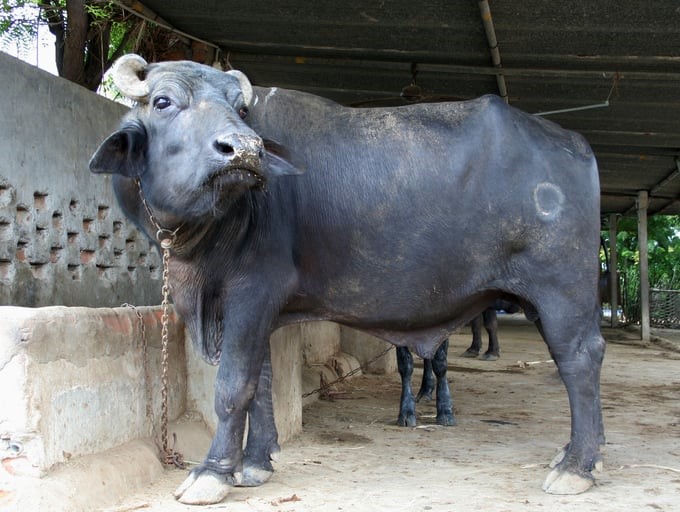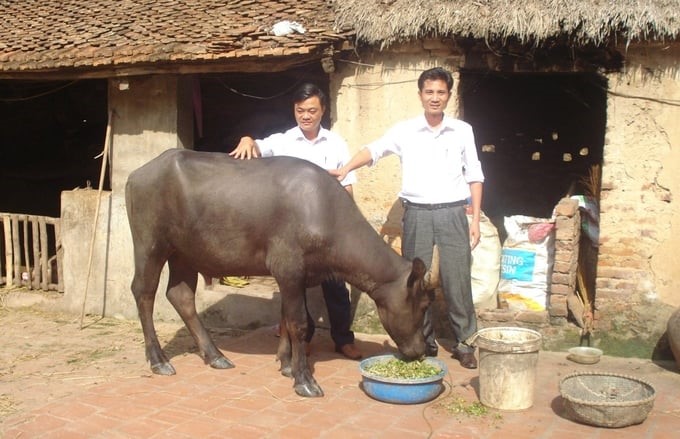June 17, 2025 | 11:31 GMT +7
June 17, 2025 | 11:31 GMT +7
Hotline: 0913.378.918
June 17, 2025 | 11:31 GMT +7
Hotline: 0913.378.918

Murrah buffalo originates from India. Photo: Pham Hieu.
Recognizing the role of the buffalo in agricultural production as well as its contribution to the rural household economy, right from the early days of establishment in 1960, the Animal Husbandry Research and Development Center for Mountainous Zone (Binh Son commune, Song Cong city, Thai Nguyen province), with the predecessor of Ba Van Horse Breeding Farm, has conducted a series of studies on the productivity of domestic water buffaloes, Murrah dairy buffaloes, hybrid buffaloes, etc.
In recent years, when the need for traction is no longer too urgent, raising buffaloes for meat has become a practical requirement. Some of the Center's research has also gone deeper in the direction of improving the volume, productivity, meat quality, and fertility of buffaloes.
According to Mr. Ta Van Can, Deputy Director of the Animal Husbandry Research and Development Center for Mountainous Zone, more than 60 years ago, the first India's Murrah buffalo was imported into Vietnam, helping Vietnam begin to renovate and enhance the quality of the Vietnamese buffalo herd.
In 1978, India gifted Vietnam 502 Murrah buffaloes, which were raised and cared for in the Southern region. Since 1995, 30 heads have been transferred to be raised and cared for at the Animal Husbandry Research and Development Center for Mountainous Zone for the purpose of storing the gene resources and raising them for milk.

The Center has crossbred India’s Murrah buffalo with the Vietnamese buffalo and created the F1 hybrid buffalo. Photo: Pham Hieu.
Murrah buffalo, also known as Indian buffalo, is a buffalo breed originating from India. The noticeable characteristics of the Murrah buffalo are its large stature and twisted horns, which are different from regular buffaloes that have arched horns. Although Murrah buffaloes are large, they are not suitable for plowing and pulling and are less heat-resistant than the swamp buffalo.
Another outstanding feature of the Murrah buffalo breed is its good ability to produce milk. A Murrah buffalo in India can produce up to 3,000 liters of milk/year. The Murrah buffalo, with its outstanding characteristics, is a high-yielding buffalo breed and one of the proudest livestock breeds in India.
“The Center's initial goal is to be able to raise buffaloes for milk supply, replacing cow's milk because buffalo milk has more nutrients than cow's milk, and the milk production rate of buffaloes is also higher than that of cows. However, due to long-term customs and habits of people, the demand for buffalo meat is higher than the demand for buffalo milk. There was a time when the price of one liter of buffalo milk was not equal to the price of one bottle of filtered water. That's why the buffalo herd could not develop in the direction of farming for milk," Mr. Ta Van Can shared.
After that, the Animal Husbandry Research and Development Center for Mountainous Zone turned to developing and cross-breeding India’s Murrah buffalo with the Vietnamese buffalo and creating the F1 hybrid buffalo with the characteristics of stature, weight, and body about 20% larger and higher than the Vietnamese buffalo. That also means that hybrid buffaloes are stronger and produce more meat than purebred Vietnamese buffaloes.
Along with India's Murrah buffalo, the Vietnamese swamp buffalo is also one of the precious buffalo breeds that are being raised and developed by the Animal Husbandry Research and Development Center for Mountainous Zone. Currently, the Center is raising a large herd of swamp buffalo with a large stature of about 600–700 kg, which originates from Thanh Chuong (Nghe An).
Previously, in 2017, the Ministry of Agriculture and Rural Development imported a herd of Thai swamp buffalo with 35 individuals to Vietnam and assigned the Animal Husbandry Research and Development Center for Mountainous Zone to take care of them, thereby allowing them to interact and cross with the Vietnamese swamp buffalo breed to freshen blood, improve and enhance stature, and avoid the situation of inbreeding.
“In recent times, localities have paid more attention to developing, improving, and breeding buffalo herds. There were times when the value of a male buffalo could be up to VND 60–70 million. Some even cost up to nearly VND 100 million," Mr. Ta Van Can said.
Translated by Huyen Vu Thu
/2025/06/12/3721-2-202745_83.jpg)
(VAN) TH made an impression at Seoul Food 2025 with its line of natural beverages, paving the way for Vietnamese food products to enter the South Korean market.

(VAN) Soc Trang's success in rice exports stems from a strategy of developing fragrant and specialty rice cultivation areas and standardizing production toward low-emission practices.
/2025/06/11/1311-5-120811_839.jpg)
(VAN) The pig farming industry is facing the challenge of comprehensive restructuring to meet requirements for quality, safety, traceability, and market expansion both domestically and for export.

(VAN) Vietnam considers participating in ALGROALBA in order to expand agricultural production, coordinate the assessment and effective exploitation potential land.
/2025/06/05/5314-1-184727_407.jpg)
(VAN) From seemingly worthless fish scales and skin, enzymes and lactic ferments can transform by-products into peptides, opening a sustainable, effective business direction and elevating Vietnamese seafood.

(VAN) TTC AgriS and IFC signed a strategic partnership to develop a sustainable agricultural value chain, aiming to achieve the Net Zero target by 2035.

(VAN) Seafood by-products are opening a new path, combining green growth and technological innovation to enhance the industry's value.